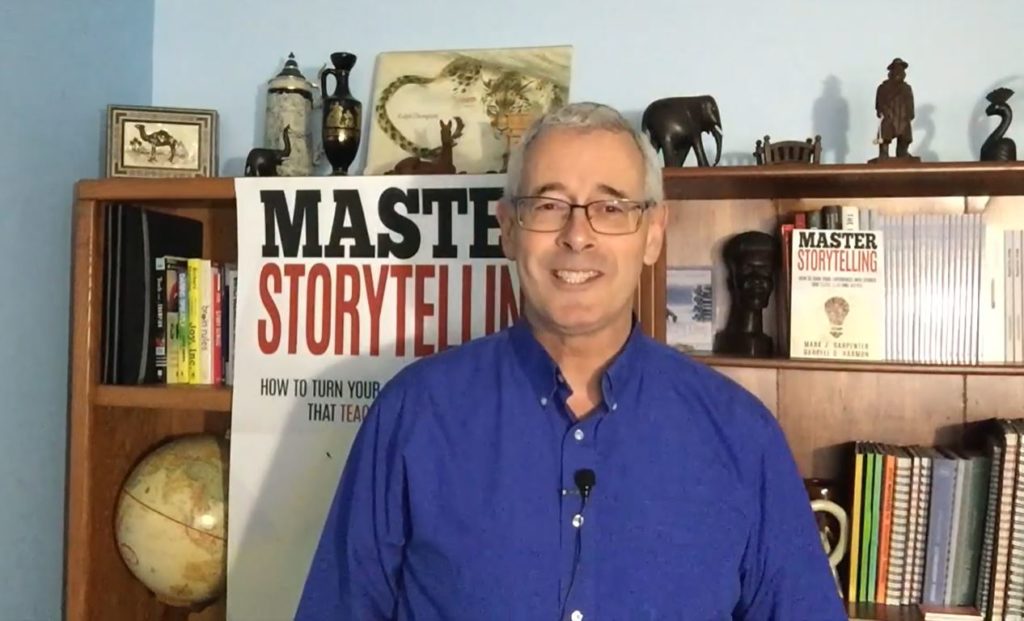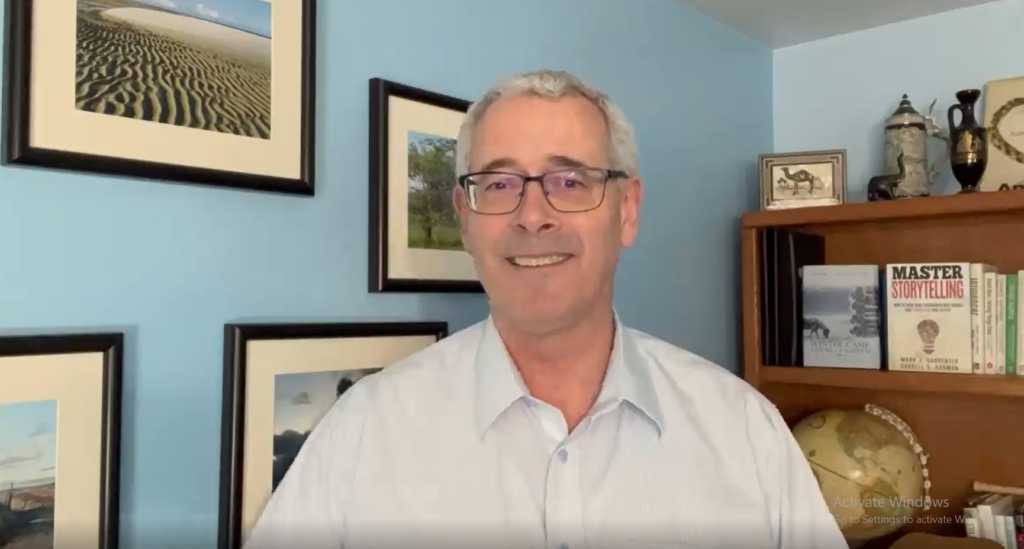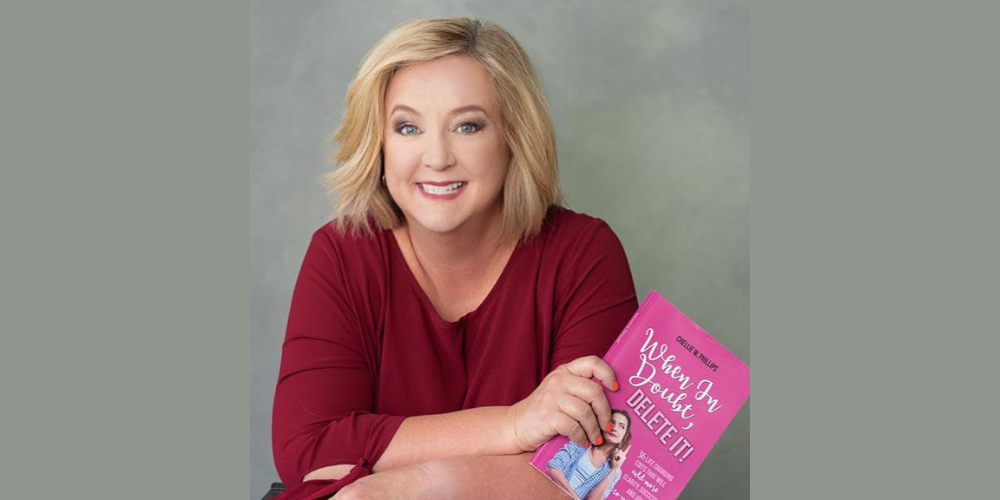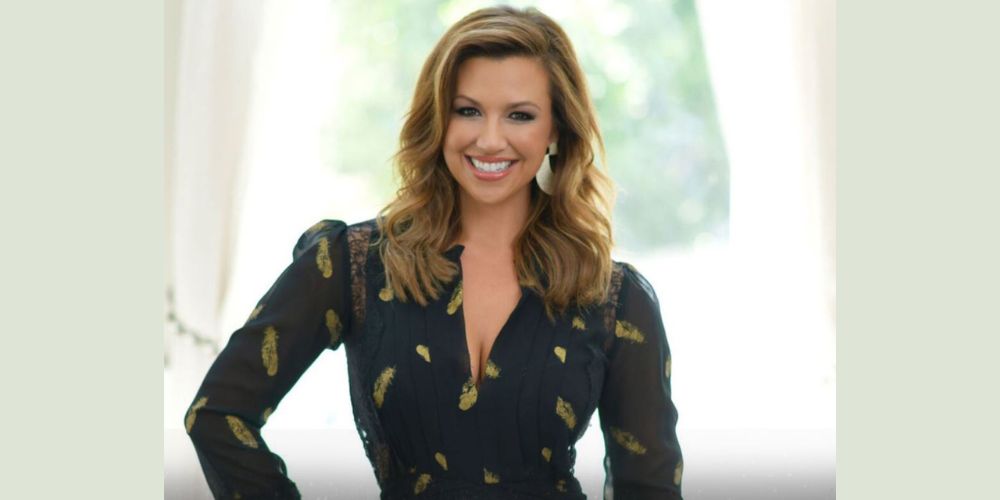Raj Girn: Hey, everyone. Welcome to another exciting edition of ‘The Transform Your Confidence Show.‘ I’m your host, Raj Girn, and I’m pleased to welcome you to this week’s media and communications-themed episode and training of sorts entitled How to Turn Your Experiences into Stories that Teach, Lead and Inspire. Also, the title of my guest Mark Carpenter’s bestselling book.
Here is our conversation:

Raj Girn: Mark, first of all, welcome to the show.
Mark Carpenter: Raj, thank you so much for having me. It’s a pleasure for me to be here with you.
I’m so pleased. And second of all, I wanted to, just off the top, ask you if you can actually share the full name of your book because I only borrowed a portion of it for the title of this episode to get us going.
Yes, you gave the subtitle of the book. The first title of the book is Master Storytelling. And we picked that title, Master Storytelling: How to turn your experiences into stories that teach, lead and inspire because master storytelling can have two different ideas around it. You know, it’s about developing master and just being a master storyteller. And so there’s some kind of play on words that we liked in there, too.
I love that. Mark, I want to kind of start and kick things off by asking you to tell us a little bit about life before you launched this book. What was it that lead up to getting to the stage of this book? By the way people, before Mark answers that, Mark is also a very well-known consultant and speaker, and he plays his extensive knowledge into helping others. Mark give us some insight into the history of Mark pre the book.

So without giving you my entire life story here, I spent my first 20 years of my career in corporate marketing and public relations, and storytelling was a part of that. And I’ve been a storyteller all my life. It was my way to get attention as a kid, to fit in a family with five children. But from that 20 years of experience in marketing, communications and public relations, I went into facilitation and training and development. And that’s where storytelling really started to hone itself even more for me.
And the thing that really led to the book into our workshop in our consulting around storytelling was I helped a friend write a book. I basically did the ghostwriting for his book. And when I got done, I said to my wife, I feel like I should write my book, but I don’t know what it is. And my wife, as one who knows me really well, looks at me and says: Oh, I know! Now, think about my first response to that. My first response is, “How can you know if I don’t know? How can you know what my book is?” And she said to me, “You need to write a book about how you take everyday experiences and turn them into lessons and turn them into things that teach important principles.” And my first response to her was, “That’s not a book. That’s just something that people do. We just know how to do that.” She goes, “No, no, not everybody is natural at doing that. You don’t think it’s a big deal because you do it very naturally. But other people don’t.”
And so that got me thinking and, again, to make a longer story shorter, I had some conversations with a dear friend of mine, Gerald Harmon, and we ended up co-authoring this book because he got excited about that content too. And the more we researched it, the more I realized I did the right things in storytelling, almost on accident. And so the research that we did, it has made me even a more deliberate storyteller with that purpose, with that intent to teach, lead and inspire.
Right. So let me ask you this right off the top for anyone out there that still doesn’t get this whole idea of the value of storytelling. Who needs storytelling?
Yeah, my unqualified answer to that is everyone. So let me qualify it just a little bit more. I would say anyone that needs to share an idea with somebody or that needs to make a connection with someone. Going back to the subtitle of the book anyone that needs to teach, to lead and inspire. And we’ve actually since added to that: teach, lead, sell and inspire, because this is how you teach complex principles. Think about the greatest lessons that you ever had in any of your schooling. It was probably not just here, the formula, but there was some story that you could connect into that principle that helped you understand it better.
We talk about leading. We talk about how do you get people to follow you? Well, you have to make a connection. It’s not just let’s just do this. The world of leading by command is gone away. We need to lead by example and by inspiration. What better way to do that than through stories? We have worked with a lot of sales organizations now. Relationships selling is a huge thing today. What better way to create those relationships than just going from facts and figures and features and benefits to “let me tell you the story about how this can benefit you.”
“The world of leading by command is gone away. We need to lead by example and by inspiration. What better way to do that than through stories?” ~Mark Carpenter
Absolutely. And that’s the holy grail right there, isn’t it Mark? And I want a deep dive a little bit further. But before we get there, let’s just give people, especially those who, as I said off the top, don’t really understand the value of storytelling, especially in business. Can you maybe break down the steps of creating an impactful story?
Sure. And when we talk about creating an impactful story we’re not just talking about making up a story. We’re not saying make up a fable. There’s a lot of great business books that are based on fables around the content that they’re getting to, and those are wonderful and they’re very connected. But we specifically want to focus on stories based on your real experiences. So that’s why the subtitle of the book is turning your experiences into stories that teach, lead, sell and inspire.
So the first step is to identify those experiences. And that’s one of the responses I get from people all the time as I teach this is, “Wow, my life’s boring, I don’t have those experiences.” And I would say, “Yes, you do.” Because the extraordinary really lives inside of the ordinary things that go on in our lives. And it’s those everyday things and anything that you experience that draws an emotion out of you, positive or negative. Anything that’s surprising or startling or brings you joy or made you afraid or made you concerned, there is a lesson within that experience that you can turn into a story to teach, lead, sell and inspire. And so that’s the first step, just identifying what are those experiences in your life that can be good stories.
Off the back of that, what have you found in the storytelling format that makes for a very powerful way to get the message across to people who don’t really know who you are? Because that’s the world we’re living in today that you feel is a great way to grab and hold their attention. Like, what would you say there?
It’s a wonderful question. When we break down, how do you turn these experiences into stories, we really just have three chunks. There’s a lot of experts out there that say, here are the 18 steps to the perfect story, or some have boiled it down to nine or something like that. We’ve got three because we want to simplify this for people and make it accessible for everybody. And that was exactly what you’re talking about Raj. It’s how do we make that connection with the person.

And that’s what we call the introduction section. In the introduction is just setting the stage for this real life experience. And again, the ordinary experiences are the most powerful because if I’ve gone to the moon, which I haven’t, but if I’ve gone to the moon, you probably can’t relate to me going to the moon. But if I talk about an experience I had going to the grocery store, you can relate to that. And when you see me as a person that you can relate to it actually connects our brain chemistry in a way that’s very, very powerful. And so set the stage with your experience in the current state that people can relate to. So there’s step number one.
Step number two is what we call conflict, and this is where something happens in your experience to change your every day and put a worthwhile goal at risk. So maybe I’m at the grocery store and I’m just trying to check out and the person in front of me in the 10 items or less line has 50 items in their cart and nobody’s saying anything to him about it. So we start to build a little bit of emotional impact. People can relate to this experience, and there’s something that’s getting in the way of me talking to that person, or there’s something getting in the way of me accomplishing my goal of just getting through the checkout line.
And then the third section we call the change. What happens to either help me accomplish my goal or to change me or others around me. That really sends the message that that’s where we teach the lesson, is in that change part. Sometimes that change part includes, how did I not handle that well that I wish I’d done better? And that we can learn from that mistake that we made, so maybe in this off the top of my head example, I see somebody in the line and I start making sarcastic comments about them. And then I find out that they’re visually impaired, and they couldn’t see that sign, that said 10 items or less. Well, now I feel like a jerk for judging someone. And if I had that to do all over again, I’d be less judgmental. So there’s the change, there’s the lesson that we get from that change section.
Absolutely. Just incredible tips. I love the fact that you really honed it down to simple yet powerful steps. And that’s the thing today, we’re so bombarded with information and so many steps and worksheets and workbooks and webinars and seminars and masterminds, that it’s nice to be able to just have a very simple elementary but potentially powerful way to be able to move things forward and learn skills and then action them. That’s the other piece of of what we do, and I feel that that’s the case with your book.
I want to ask you this. Can you share some tips on how to hone and deliver a story with purpose in a really genuine way, but also to have a little bit of panache and throw in a bit of your own persona? Because I find that oftentimes when we hear what seems like the same message delivered in the same way, we’re not really paying heed to it. So there’s kind of this marriage between purpose and conviction and being authentic and genuine to what you’re delivering, but also adding in a bit of you to it. But talk to me a little bit about that.
“I find that oftentimes when we hear what seems like the same message delivered in the same way, we’re not really paying heed to it. So there’s this marriage between purpose and conviction and being authentic and genuine to what you’re delivering, but also adding in a bit of you to it.”
~Raj Girn
Yeah. And I’m just sitting back here grinning because you’ve really said the first thing that I wanted to say about this, which is be authentic. Be yourself, don’t try to be somebody else. If you try to be somebody else that will come across to people and it’ll lose the connection. You’ll disconnect with people because people will feel that lack of authenticity from you. So be yourself, be your best self. But be yourself in that situation.
The other thing I’ll say is practice and and it really comes down to just trying it out and paying attention to what you’re doing. Sometimes people, when they start out with this skill, if it’s a new skill for them, they get uncomfortable practicing in front of somebody else. They don’t want to do this in front of somebody else or be so vulnerable, so exposed in that situation. And so my suggestion is twofold.
Number one, just pull out your phone and put the selfie mode on. Record yourself telling the story and watch it yourself. Coach yourself in that situation. You’ll pick up a lot of things. Now, there’s going to be some things that you’re going to pick up and say, “I hate that” or “I hate the way that my eyes look in this situation” that other people won’t notice.
So I also encourage you to get a friendly coach and ask your coach to give you feedback on only two questions. One, what did you like about the story? And two, what did you feel was the main point of that story? And if you start at that level, you will get good feedback, but it’s mostly going to be positive feedback. And you’ll also see things that you thought were really bad and really terrible. And the other person didn’t notice at all. And so that’s really good feedback to have as well.
Absolutely. I love it. Mark, often times, I’m speaking from experience with my clients, they tell me that they don’t really feel confident using the storytelling methodology because, and you’ve kind of broached this topic already, they don’t really feel that they have a signature life story that they can parlay into the value proposition that they’re offering up. What would you say to them?
I know that you’ve already talked about this with your analogy around the grocery store, but is there anything that you can really hone in on for people in terms of how they make the connection between something that is unique to their life experience and make it something that will really touch the people that they’re trying to touch, you know, that target demographic. How do they parlay the two together from your experience?
The first thing I’d say is it’s like any new skill, you just have to try it. Somebody can talk to you about riding a bicycle, but you never really understand how to ride a bicycle until you actually try it and maybe get some coaching and get some tips and some help and some feedback. And yeah, you’re going to tip over and fall a couple of times. The same is going to be true with any skill.

There’s going to be times storytelling is going to fall flat for you. It’s fallen flat for me sometimes when I haven’t prepared myself well enough. And so just try it and don’t be afraid to step into a new skill. The second part of my answer, I’m going to answer actually with a quick story. I was talking to a friend of mine. I had lunch with a friend of mine earlier this week, and he’s been through our storytelling workshop. He’s an excellent facilitator. And he said to me, “I go into every facilitation that I do now thinking about what has happened to me in the last week that I can turn into a story. What has gone on in my life that I could make this point with?” He said “It’s made me very deliberate in doing that, and it’s honed my skill by forcing myself to come up with new examples and new illustrations of the things that I’ve taught all the time.” He says, “Sometimes I’m going back to the same audience and I think, ‘did I already tell them this story?’ And so it helps me to be able to come up with something new each week because I’m looking for that.” And so that’s the second tip that I would give is just follow my friend’s example there. Look for those things. Be aware of it. Be conscious and deliberate about using storytelling to help you accomplish your goals.
Absolutely. You know, Mark the most competent leaders in any industry, because you’ve got me thinking, now and really in any time in history have also been very powerful and impactful storytellers. I mean, if we look at any of them: Christ, Hitler, Steve Jobs, Willie Nelson, Sadhguru. The list goes on and on and on, and they all have the same common denominator of being able to tell very powerful and impactful stories. What’s the connection here for anyone who can’t see it? What’s the connection between being a very powerful and impactful storyteller and being a really powerful and empowering leader?
Yeah, I just think there’s a super strong connection there and you raise some really good high level famous examples. Yeah, I’d even put that down to our everyday level. If you think about and I’m putting this to you, to your listeners as well. Think about leaders that have had a great impact on your life, great leaders or mentors. And think about the times that you really remember the interaction with them. And there’s probably a story that they told to make that happen.
“Think about leaders that have had a great impact on your life, great leaders or mentors. And think about the times that you really remember the interaction with them. And there’s probably a story that they told to make that happen.” ~Mark Carpenter
Part of it is just understanding what’s going on inside our brains when we hear stories. There’s been a ton of research, and this is something that I learned as we were researching the book because I didn’t know this before, but there there are huge impacts in the brains of your listeners as you’re telling stories. Dr. Uri Hussain, who’s at Princeton, he did this research where he had a storyteller and a listener, and he hooked both of them up to functional MRIs. And he tracked their brain activity as one was telling the story and the other was listening. And at first, the listener’s brain activity followed very closely behind what the storyteller was doing, how the storyteller’s brain was was acting. But as the story progressed, the listener started to catch up. And their brain started to come into sync. So think about this if you want people to be on the same page with you. Storytelling is a great way to get you there.
There was another study and this was referenced in the book influencer, where they had three groups of people and they gave them the same information, but they gave them three different ways of receiving the information. The first group, they just gave them the data, they just told them verbally. The second group, they told them verbally and they put it on charts and graphs for them to see. And the third group they told it in the form of a story. And they expected in this research that the people hearing the story version would remember it better. And they were right. In fact, those first two groups, I would have thought the people with the charts and the graphs would have actually remembered better than just those getting it verbally. They remembered it about the same level in terms of accuracy in the amount of information that they remembered.
The group, who received it as a story, not only remembered more of the information and remembered it more accurately. But the thing that was surprising to the researchers and to me was they found the information more credible. So think about that if you’re trying to share information with people and you want to be credible. We think that data and charts and graphs makes us more credible, but this research indicates that storytelling actually makes information more credible. And so that’s the empowering part of storytelling as a leader is it’s really going to draw people to you and make that connection that you need to help teach, lead and inspire.
Absolutely. You know, Mark, there’s another aspect that I wanted to chat with you a little bit about as well which kind of leads is a little bit into this whole idea of the connection and the power of storytelling in sales. So storytelling is both an art and a skill. I want to kind of preface this a little bit by saying that my life experience has taught me that it’s more of an art than a skill, especially when I look back at my early days pitching multinationals on why my media company, ANOKHI, was worth betting on for their advertising and sponsorship dollars.
Mark I had absolutely no benchmarks or case studies to base my convictions on because niche marketing didn’t exist in the early 2000s the way it does today, and my company targeted the then very marginalized and underserved South Asian market in North America, which today is a powerhouse community. In those days, I relied heavily on the storytelling of the underdog and really them having the monopoly.
And when I talk about them, I’m talking about the companies I used to approach to get their dollars. I used to tell them that here is an opportunity for them to monopolize the market that other people aren’t seeing right? And to be able to understand how to hone in on their value and to bring them to the table because of the fact that they were the second largest, most powerful when it came to money spending expenditure in North America market.
So it was really interesting because I created my entire sales infrastructure on this idea that relied almost completely on the story and on the art of delivery. Mark, you talk about the art and science of effective storytelling. Share what you’ve discovered with everyone here, especially those who don’t buy into its relationship with generating sales. Your experience, your words. Talk to me.
Such a great example in what you just shared. I couldn’t come up with a better example than the example that you just shared of the impact in the power of storytelling. And yes, it’s an art in the terms of something that you have to keep practicing, you have to keep working on it. And even when you’re good at it, you still need to hone that skill. You still need to work on it, think of great musicians or great artists in any field, they never stop honing their craft. They’re always working on getting better and better and better at it. And so that’s the art side of it.
The science side of it is just really understanding the impact on people’s brains as they’re listening to your story. And so that’s going to make you more intentional about thinking about who you’re talking to. I’ll use your example. You probably thought of those people that you were talking to, that you were trying to sell that idea to, and that underdog story would resonate with them. So think of what’s going to resonate to the people that you listen to because that’s where the the connections in our brains is going to happen. And so that’s the science side of it is understanding, who am I talking to and what can they relate to? I don’t want to tell a story that they couldn’t relate to at all because I missed the opportunity to make the connection.
“What’s going to resonate to the people that you listen to because that’s where the the connections in our brains is going to happen. And so that’s the science side of it is understanding who am I talking to and what can they relate to? I don’t want to tell a story that they couldn’t relate to at all because I missed the opportunity to make the connection.” ~Mark Carpenter
Right. And that’s the point here.
Yeah. And if I’m conscious about it, if I’m deliberate about it, I can do that. I think that’s one of the mistakes that people make in storytelling is they hear, yeah, storytelling is effective. Okay it’s good to tell a story, but they just randomly tell a story, and maybe they don’t have a good purpose to it. Or maybe they don’t think about who they’re telling it to or craft that story a little bit differently for the different audience. Because I may be talking to one audience and tell a story that emphasizes certain points because I know that will resonate with that audience. And I may completely leave those elements out of the same story for a different audience that I know can’t make that connection.
Absolutely. So this brings me to this. What are the biggest mistakes people make when telling stories?
Yeah, and I think the first one is the one that I just mentioned. It is not being intentional. It’s not being intentional about this story and about the purpose. It’s telling a story just to tell a story, not with some purpose at the end. And so that intentionality, I think, is the biggest mistake that people make. I think the second one is, I refer to it as they don’t land the plane. And by that, they tell their experience and they get so lost in the details of their experience that they don’t get to the point at the end. They don’t edit themselves to get there. And so that’s a mistake that I think people very commonly make. A third one and I referenced it a little bit earlier in the previous answer, is not knowing their audience or not considering who their audience is and customizing to their audience.

Quick example, this example is actually in the book, too. I was in the audience one time when someone was giving a speech and it was a mixed audience with a bunch of different professions in this audience. Well, the person giving the speech was a nurse. And she kept using terminology from the medical profession, acronyms from the medical profession. Now I benefited by the fact that I was sitting next to my wife, who was trained as an X-ray technician. And so I can’t tell.
I think it was like five times during this 12 minute speech that I turned to my wife and I said, “What does that mean?” And she would explain it to me, but think of what’s happening to me now in that story. Because as I asked my wife, what does that mean, I get an answer. Well, now she’s three steps ahead in the story. And I’ve lost track. And so she lost me as an audience member because she wasn’t speaking to me, she was speaking to a medical audience. So think about what your audience understands, what your audience can relate to and edit yourself based on who your audience is. I think that’s a mistake that people make, that they don’t do that.
“Think about what your audience understands, what your audience can relate to and edit yourself based on who your audience is. I think that’s a mistake that people make, that they don’t do that.” ~Mark Carpenter
So if people want to learn how to storytell the right way, you have a couple of opportunities. You’ve got the book, you have your course. Can we talk a little bit about both?
You bet. Yeah. The book is available on Amazon. In fact, I would love to offer your audience a free copy of the e-book.
Oh my god, that would be brilliant.
If you’re okay with that.
Absolutely. Everybody, there will be a link actually down below in the caption. So just make sure that you just hop on over there. We’ll just make sure that that’s taken care of. Mark, you are a gem. Thank you so much for that.
No, I’m happy to do that and to get it out there. This is why I do what I do. Because I want to provide value for people. This is why I’m coming on your podcast. This is why we wrote the book.
Absolutely.
So I will offer that to everybody. There’s one option. We’ve got the book in e-book format, in audio book and in paperback and hardback only. And if you’re an audio book listener and you can stand the sound of my voice for three hours, you can get the audio book because I recorded the audio book as well. The workshop that we have, we will do this within companies with intact teams. We also do this as a virtual offering online. And so you can find out when those dates are at master-storytelling.com and the hyphen is super important to separate those two words.
Can we get that again?
Yeah. Master-storytelling.com.
Perfect. And guys, the hyphen is not spelled out. Is the actual symbol hyphen right?
Thank you, for a clarification. And so we have those on a regular basis. We do those several times a year and you can contact us. We also do storytelling coaching, where will will sit down for an hour with you on Zoom and let you tell stories and give you feedback and let you practice them again and let you work it again. Actually, one of the things that I love about the workshop that we do is we give you the opportunity to develop and practice a story right in the workshop as well. And so value comes in actually doing it. It’s not just hearing about it, talking about it, but it’s actually doing it. And so we provide that as an avenue for learning in the workshop.
Absolutely. Again, for everybody listening in watching this, reading it on our blog, give us the URL again.
Yes, it’s master and then a little hyphen storytelling dot com.
Brilliant. And can people hang out with you on social? Do you give like tips and resources and stuff like that on social or anywhere else? In newsletter maybe?
Yeah, absolutely. I’m on LinkedIn and Facebook. Just search for Master Storytelling on LinkedIn and Facebook, and I do what I call a story of the week every week on LinkedIn. I tell people, you have these experiences all the time that can be impactful stories. I’m trying to put my time where my mouth is and putting a story out every week so that I can show that if I can do it, you can do it. And then on our Facebook page, I do a Tuesday tip for storytelling, which gives some tips around those common mistakes that we tend to make in storytelling. And so those are the offerings that I have in social media.
Absolutely love it, Mark. You know, is there anything you feel that we haven’t touched upon that you’d like to leave everyone with?
I think that my parting comment would would be, if you’re still hesitant, just try it, try it out. You don’t know the impact it can have until you try. So look for examples in your life. Be deliberate and purposeful about that. I encourage people to keep a storytelling journal, whether it’s a note section on your phone or wherever. But when something happens to you, take note of it. The story may come later. But try it out, look for those experiences that can be opportunities to teach, lead, sell and inspire. And once you try it, you’re going to see the benefit.
“If you’re still hesitant, just try it, try it out. You don’t know the impact it can have until you try.” ~Mark Carpenter
Absolutely, yes. And if you can’t get it, you got to go work with Mark, guys. Mark what a pleasure you are. Thank you so much for coming on, sharing your story, giving our viewers, listeners and readers a leg up in this metaverse that we are now all being pushed into where we all need to find innovative ways to stand out as a brand. Thank you.
Thank you, Raj. I’ve enjoyed the conversation with you and appreciate the great work you’re doing.
Thank you so much, Mark. Folks, what better way than learning how to tell a compelling story that touches people’s emotions on some palpable level that will make you and what you do or offer unforgettable?
Guys, I really hope that you got some real value from today’s show and will share it with everyone you know who you feel needs to get today’s insights. I also hope that you will subscribe to my YouTube channel at The Open Chest Confidence Academy so you never miss an episode when we drop one every single Wednesday, as well as our podcast platforms. You can go search and save ‘The Transform Your Confidence Show.’ And if you’re a little bit old school like I am and you like to have the read, just hop on over to our website, theopenchestconfidenceacademy.com/media/podcast, and you can just go and bookmark any of the episodes that you feel really kind of speak to you.
And as I always say, guys, the whole purpose of why I do this show is I want to be able to provide you guys with actually actionable knowledge from people in the industry that are doing the great work that they’re doing that can really help you push forward with your brand and empower you and your life.
As always, I hope you have the very best week, and I look forward to seeing you next week.












